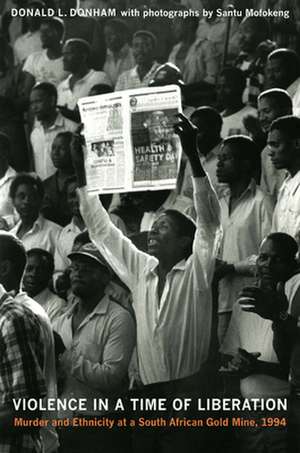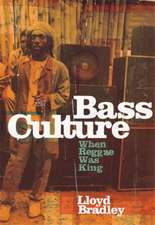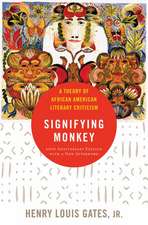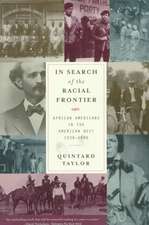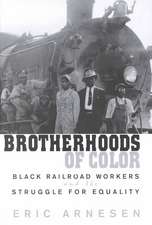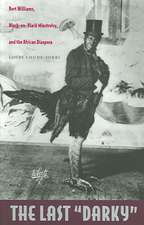Violence in a Time of Liberation – Murder and Ethnicity at a South African Gold Mine, 1994
Autor Donald L. Donhamen Limba Engleză Paperback – 20 iul 2011
Preț: 328.72 lei
Nou
Puncte Express: 493
Preț estimativ în valută:
62.90€ • 65.98$ • 52.36£
62.90€ • 65.98$ • 52.36£
Carte tipărită la comandă
Livrare economică 01-15 aprilie
Preluare comenzi: 021 569.72.76
Specificații
ISBN-13: 9780822348535
ISBN-10: 0822348535
Pagini: 256
Ilustrații: 50 b&w photographs, 2 tables, 1 figure
Dimensiuni: 156 x 233 x 21 mm
Greutate: 1.97 kg
Editura: MD – Duke University Press
ISBN-10: 0822348535
Pagini: 256
Ilustrații: 50 b&w photographs, 2 tables, 1 figure
Dimensiuni: 156 x 233 x 21 mm
Greutate: 1.97 kg
Editura: MD – Duke University Press
Cuprins
Contents; List of Figures; Photographic Essay: List of Plates; Preface; Groups at Cinderella in 1994; Local Timeline in Relation to the Democratic TransitionIntroduction; 1: Picturing a South African Gold Mine; 2: White Stories; 3: Ways of Dying; 4: Good Friday at Cinderella; 5: Freeing Workers and Erasing History; 6: Unionization from Above; 7: Motives for Murder; 8: The Aftermath; Conclusion ; Postscript: Doing Fieldwork at the End of Apartheid
Recenzii
Taking off from a single episode, Donald L. Donham provides readers with a rich account that makes an important point: ethnic identification is often more the consequence of violence than the cause. Since people involved may, in retrospect, interpret an event using ethnic categories, understanding the complexity of the processes leading up to violence requires peeling back layers of backward projection and a reconstruction of the flow of events, tasks Donham performs here with sensitivity and insight. Frederick Cooper, author of Colonialism in Question: Theory, Knowledge, History
#Violence in a Time of Liberation is an absorbing and exceptionally clear-sighted analysis of violence and ethnic consciousness in South Africa. Focused on a specific set of events that occurred at a gold mine in the mid-1990s, Donald L. Donham brings vivid ethnographic description and analysis to bear on some of the thorniest questions faced by social analysts of violence. His book is lucidly written and cunningly constructed, with a substantial narrative pull. It is a very significant contribution both to scholarly understandings of contemporary South African society and to theoretical debates around ethnic violence. James Ferguson, author of Global Shadows: Africa in the Neoliberal World Order
"Violence in a Time of Liberation by Donald Donham, a University of California anthropologist, published last year, offers a prescient narrative of mine violence. Based on a study of a mine called Cinderella, it provides a piercing and lucid exposition of the path to this violence in a post-1994 moment.... Violence in a Time of Liberation offers an exemplary example of how historical ethnography can be used to study violence. It probes us to give time and labour to understand better what has happened, even if its meanings remain elusive. For violence, too, is a way of remembering our disappointed hope." South Africa's Mail & Guardian, September 28th 2012
"Puzzled by the 1990s ethnicity card being played in South Africa along with the rejection of former apartheid policies based on blatant racist assumptions on cultural differences and ethnic boundaries, Donham dove into a sea of narratives about the event and came up stating that Cinderellas murders were symptomatic of processes created by national liberation in South Africa.... If two decades ago Donhams perspective might have sounded preposterous in some academic and political circles, the 2012 debates on the Marikana massacre have shown that more than atavist ethnical threatening values, disputes between unionists for miner allegiance could also be plausible causes for the killing of more than 30 workers during a strike. Extensive research and creative analysis like Donhams have helped to weave less dichotomous and more nuanced narratives on contemporary South Africa and its particular way of building democratic representation in a highly unequal capitalist scenario." - Social Anthropology/Anthropologie Sociale, May 2013
"Taking off from a single episode, Donald L. Donham provides readers with a rich account that makes an important point: ethnic identification is often more the consequence of violence than the cause. Since people involved may, in retrospect, interpret an event using ethnic categories, understanding the complexity of the processes leading up to violence requires peeling back layers of backward projection and a reconstruction of the flow of events, tasks Donham performs here with sensitivity and insight." Frederick Cooper, author of Colonialism in Question: Theory, Knowledge, History # "Violence in a Time of Liberation is an absorbing and exceptionally clear-sighted analysis of violence and ethnic consciousness in South Africa. Focused on a specific set of events that occurred at a gold mine in the mid-1990s, Donald L. Donham brings vivid ethnographic description and analysis to bear on some of the thorniest questions faced by social analysts of violence. His book is lucidly written and cunningly constructed, with a substantial narrative pull. It is a very significant contribution both to scholarly understandings of contemporary South African society and to theoretical debates around ethnic violence." James Ferguson, author of Global Shadows: Africa in the Neoliberal World Order "Violence in a Time of Liberation by Donald Donham, a University of California anthropologist, published last year, offers a prescient narrative of mine violence. Based on a study of a mine called Cinderella, it provides a piercing and lucid exposition of the path to this violence in a post-1994 moment... Violence in a Time of Liberation offers an exemplary example of how historical ethnography can be used to study violence. It probes us to give time and labour to understand better what has happened, even if its meanings remain elusive. For violence, too, is a way of remembering our disappointed hope." South Africa's Mail & Guardian, September 28th 2012 "Puzzled by the 1990s ethnicity card being played in South Africa along with the rejection of former apartheid policies based on blatant racist assumptions on cultural differences and ethnic boundaries, Donham dove into a sea of narratives about the event and came up stating that Cinderella's murders were 'symptomatic of processes created by national liberation in South Africa'... If two decades ago Donham's perspective might have sounded preposterous in some academic and political circles, the 2012 debates on the Marikana massacre have shown that more than atavist ethnical threatening values, disputes between unionists for miner allegiance could also be plausible causes for the killing of more than 30 workers during a strike. Extensive research and creative analysis like Donham's have helped to weave less dichotomous and more nuanced narratives on contemporary South Africa and its particular way of building democratic representation in a highly unequal capitalist scenario." - Social Anthropology/Anthropologie Sociale, May 2013
#Violence in a Time of Liberation is an absorbing and exceptionally clear-sighted analysis of violence and ethnic consciousness in South Africa. Focused on a specific set of events that occurred at a gold mine in the mid-1990s, Donald L. Donham brings vivid ethnographic description and analysis to bear on some of the thorniest questions faced by social analysts of violence. His book is lucidly written and cunningly constructed, with a substantial narrative pull. It is a very significant contribution both to scholarly understandings of contemporary South African society and to theoretical debates around ethnic violence. James Ferguson, author of Global Shadows: Africa in the Neoliberal World Order
"Violence in a Time of Liberation by Donald Donham, a University of California anthropologist, published last year, offers a prescient narrative of mine violence. Based on a study of a mine called Cinderella, it provides a piercing and lucid exposition of the path to this violence in a post-1994 moment.... Violence in a Time of Liberation offers an exemplary example of how historical ethnography can be used to study violence. It probes us to give time and labour to understand better what has happened, even if its meanings remain elusive. For violence, too, is a way of remembering our disappointed hope." South Africa's Mail & Guardian, September 28th 2012
"Puzzled by the 1990s ethnicity card being played in South Africa along with the rejection of former apartheid policies based on blatant racist assumptions on cultural differences and ethnic boundaries, Donham dove into a sea of narratives about the event and came up stating that Cinderellas murders were symptomatic of processes created by national liberation in South Africa.... If two decades ago Donhams perspective might have sounded preposterous in some academic and political circles, the 2012 debates on the Marikana massacre have shown that more than atavist ethnical threatening values, disputes between unionists for miner allegiance could also be plausible causes for the killing of more than 30 workers during a strike. Extensive research and creative analysis like Donhams have helped to weave less dichotomous and more nuanced narratives on contemporary South Africa and its particular way of building democratic representation in a highly unequal capitalist scenario." - Social Anthropology/Anthropologie Sociale, May 2013
"Taking off from a single episode, Donald L. Donham provides readers with a rich account that makes an important point: ethnic identification is often more the consequence of violence than the cause. Since people involved may, in retrospect, interpret an event using ethnic categories, understanding the complexity of the processes leading up to violence requires peeling back layers of backward projection and a reconstruction of the flow of events, tasks Donham performs here with sensitivity and insight." Frederick Cooper, author of Colonialism in Question: Theory, Knowledge, History # "Violence in a Time of Liberation is an absorbing and exceptionally clear-sighted analysis of violence and ethnic consciousness in South Africa. Focused on a specific set of events that occurred at a gold mine in the mid-1990s, Donald L. Donham brings vivid ethnographic description and analysis to bear on some of the thorniest questions faced by social analysts of violence. His book is lucidly written and cunningly constructed, with a substantial narrative pull. It is a very significant contribution both to scholarly understandings of contemporary South African society and to theoretical debates around ethnic violence." James Ferguson, author of Global Shadows: Africa in the Neoliberal World Order "Violence in a Time of Liberation by Donald Donham, a University of California anthropologist, published last year, offers a prescient narrative of mine violence. Based on a study of a mine called Cinderella, it provides a piercing and lucid exposition of the path to this violence in a post-1994 moment... Violence in a Time of Liberation offers an exemplary example of how historical ethnography can be used to study violence. It probes us to give time and labour to understand better what has happened, even if its meanings remain elusive. For violence, too, is a way of remembering our disappointed hope." South Africa's Mail & Guardian, September 28th 2012 "Puzzled by the 1990s ethnicity card being played in South Africa along with the rejection of former apartheid policies based on blatant racist assumptions on cultural differences and ethnic boundaries, Donham dove into a sea of narratives about the event and came up stating that Cinderella's murders were 'symptomatic of processes created by national liberation in South Africa'... If two decades ago Donham's perspective might have sounded preposterous in some academic and political circles, the 2012 debates on the Marikana massacre have shown that more than atavist ethnical threatening values, disputes between unionists for miner allegiance could also be plausible causes for the killing of more than 30 workers during a strike. Extensive research and creative analysis like Donham's have helped to weave less dichotomous and more nuanced narratives on contemporary South Africa and its particular way of building democratic representation in a highly unequal capitalist scenario." - Social Anthropology/Anthropologie Sociale, May 2013
Notă biografică
Descriere
Shows that heightened ethnic identity among black workers was more an outcome than a cause of two murders in a South African gold mine
